19-01
God Sent the Prophets [19-01]
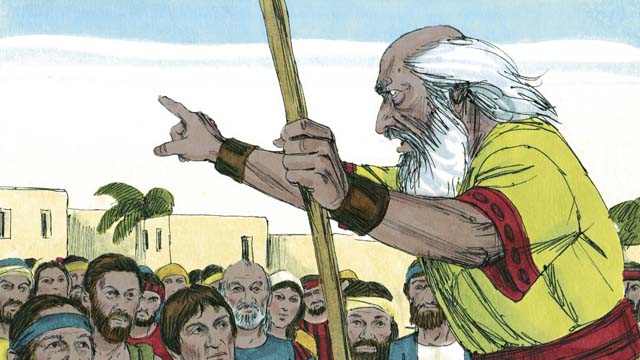
Throughout the history of the Israelites, God sent them prophets. The prophets heard messages from God and then told the people God’s messages.
综观以色列人的历史,神一直在向他们差派先知。先知可以听到来自神的信息并将这些信息传给以色列人。
Important Terms:
Translation Notes:
- Throughout the history of - This expression means that God sent many prophets at many different times during all of the years that Israel and Judah existed.
- Israelites - This could be translated here as, "the kingdoms of Israel and Judah." All of the descendants of Jacob, including those in the kingdom of Judah, continued to be called "Israelites."
19-02
Elijah Rebuked Ahab [19-02]
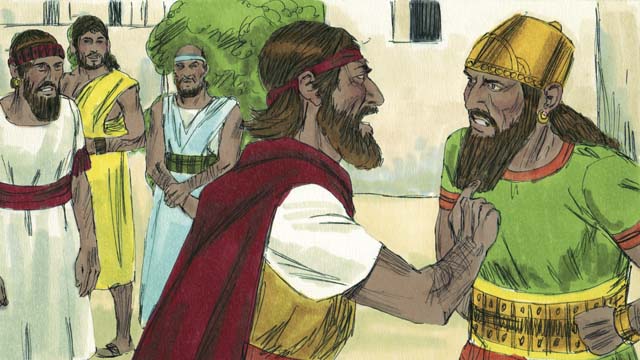
Elijah was a prophet when Ahab was king over the kingdom of Israel. Ahab was an evil man who encouraged people to worship a false god named Baal. Elijah said to Ahab, “There will be no rain or dew in the kingdom of Israel until I say so.” This made Ahab very angry.
.“亚哈作以色列王的时候,以利亚是先知。亚哈很邪恶,他鼓励民众去敬拜假神巴力。以利亚对亚哈说,“除非我祈求,否则以色列全地就不会下一滴雨。”
Important Terms:
Translation Notes:
- until I say so - This may be translated as, "until I command the rain and dew to come again."
- This made Ahab very angry – This could be translated as, "When Ahab heard what Elijah said, he became very angry."
19-03
God Provided for Elijah [19-03]
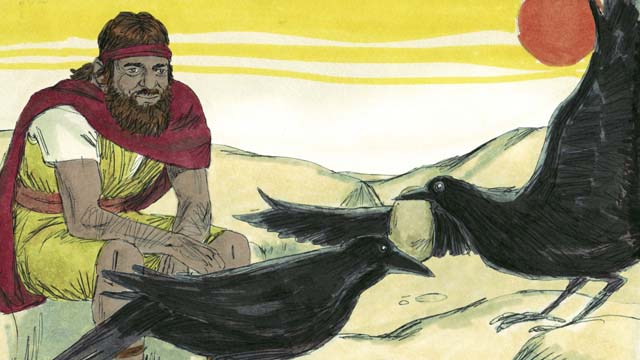
God told Elijah to go to a stream in the wilderness to hide from Ahab who wanted to kill him. Every morning and every evening, birds would bring him bread and meat. Ahab and his army looked for Elijah, but they could not find him. The drought was so severe that the stream eventually dried up.
神让以利亚藏在一条小溪旁的野地里。每天早晚,有鸟儿为他衔来饼和肉。亚哈和他的军队寻找以利亚,却找不到。
Important Terms:
Translation Notes:
- the wilderness - This was a remote location with very few people. This may also be translated as, "desert" or, "the bush."
- The drought - This could be translated as, "the lack of rain." This drought was a result of Elijah declaring that there would be no rain.
19-04
God Provided for the Widow [19-04]
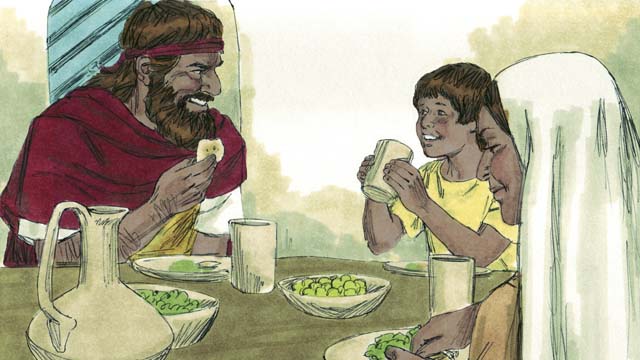
So Elijah went to a neighboring country. A widow and her son in that country had almost run out of food because of the famine. But they took care of Elijah, and God provided for them so that their flour jar and their bottle of oil never became empty. They had food through the whole famine. Elijah stayed there for several years.
以利亚去了邻国。一个寡妇带着他的儿子,快要没有食物了,因为地大旱。但他们照顾以利亚,而神供应他们,以至于他们的粮罐和油瓶充充足足。在整个大饥荒,他们都有足够的食物。以利亚在那里待了很久。
Important Terms:
Translation Notes:
- neighboring country - This refers to a country that was beside, or shared a border with Israel.
- the famine - If needed, this could be translated as, "the famine caused by the drought."
- took care of – This means they gave him a place to stay in their house and provided food for him. It does not mean he was sick.
- God provided for them…never became empty - This could be translated as, "God prevented their flour jar and their bottle of oil from becoming empty" or, "God caused…to never become empty."
- flour jar - This refers to a clay jar in which the widow kept her supply of flour.
- bottle of oil - In Israel, olive oil is used for cooking. This could be translated as, "bottle of cooking oil." The widow used the flour and the oil for making bread.
19-05
Elijah Challenged Ahab [19-05]
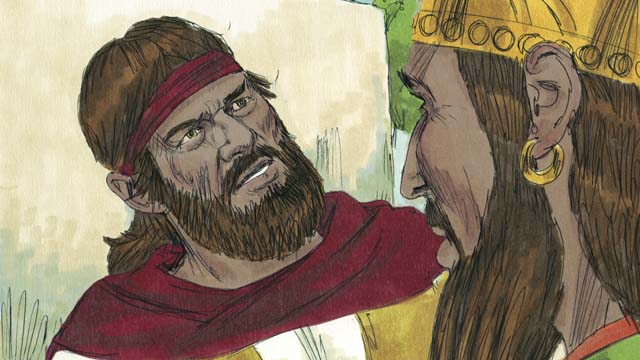
After three and a half years, God told Elijah to return to the kingdom of Israel and speak with Ahab because he was going to send rain again. When Ahab saw Elijah he said, “There you are, you troublemaker!” Elijah replied to him, “You are the troublemaker! You have abandoned Yahweh, the true God, and worshiped Baal. Bring all the people of the kingdom of Israel to Mount Carmel.”
三年后,神让以利亚回到以色列并与亚哈说话,因为他将再次降雨。亚哈见到以利亚的时候说,“你这个闹事者在这呢。”以利亚说,“你才是闹事者呢!你背弃了真神,却去拜巴力。把以色列人都带到迦密山来!”
Important Terms:
Translation Notes:
- speak with Ahab because he was going to send – This could be translated as, "tell Ahab that God was going to send."
- you troublemaker - This means, "You are a troublemaker!" Ahab was accusing Elijah of causing trouble by telling the king that he was doing wrong and also by stopping the rain.
- You have abandoned Yahweh - That is, Ahab had led Israel to stop worshiping and obeying Yahweh.
- Mount Carmel - Mount Carmel is the name of a mountain located in northern Israel. It is over 500 meters high.
19-06
Elijah and the Prophets of Baal [19-06]
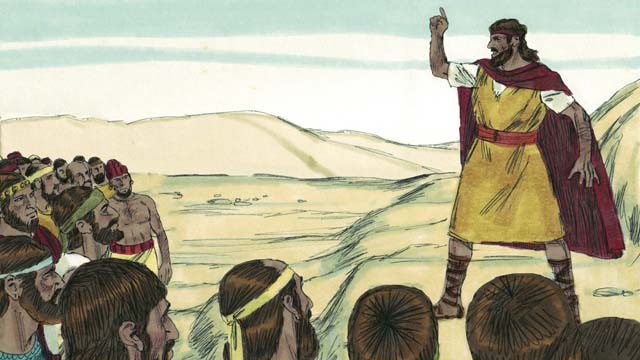
All the people of the kingdom of Israel, including the 450 prophets of Baal, came to Mount Carmel. Elijah said to the people, “How long will you keep changing your mind? If Yahweh is God, serve him! If Baal is God, serve him!”
所有的以色列人,包括400个拜巴力的先知,都来到了迦密山。以利亚说,“你们多久才会改变心意呢?如果主是神,你们就拜主,如果巴力是神,你们就拜巴力!”
Important Terms:
Translation Notes:
- Mount Carmel - See how you translated this in [[:zh:obs:notes:frames:19-05|[19-05]]].
- How long will you - This is not a real question asking for information. Elijah was rebuking the Israelites for repeatedly changing their minds about whether they would serve Yahweh or Baal. Some languages will have to express this as a statement such as, "Stop changing your minds about whom you will worship!"
- If Yahweh is God…If Baal is God - This does not mean that Elijah was undecided. He knew that Yahweh is the real God. He wanted the people to understand that when they worship false gods, they are rejecting Yahweh as the only true God. Translate this in a way that shows that the people had to make a choice.
19-07
A Sacrifice without Fire [19-07]
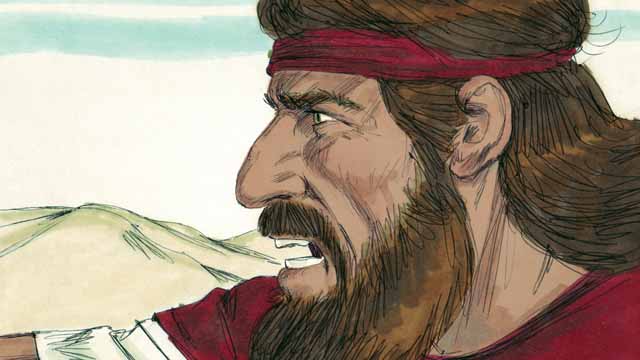
Then Elijah said to the prophets of Baal, “Kill a bull and prepare it as a sacrifice, but do not light the fire. I will do the same. The God who answers with fire is the real God.” So the priests of Baal prepared a sacrifice but did not light the fire.
他对巴力的先知们说,“杀掉一头牛,准备一个祭品,但不要生火。我也这样做。哪位神能用火回答,这位神就是真神。”巴力的祭司便准备了祭品,但是没有生火。
Important Terms:
Translation Notes:
- who answers with fire - That is, "who supernaturally sends fire to burn up the sacrifice."
- the real God - This means the one and only true God.
19-08
Baal Did Not Answer [19-08]
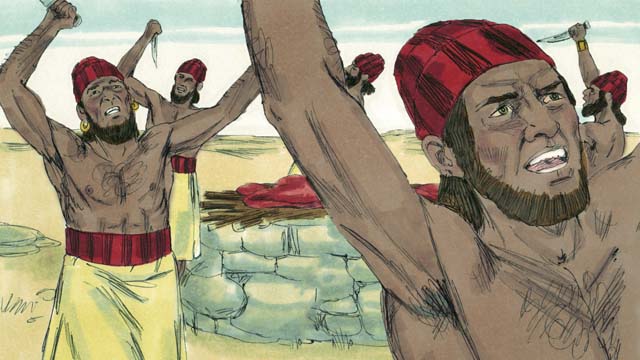
Then the prophets of Baal prayed to Baal, “Hear us, Baal!” All day long they prayed and shouted and even cut themselves with knives, but there was no answer.
他们向巴力祈求说,“巴力啊,听我们!”他们祈求呼喊了一整天,甚至用刀割自己的身体,巴力也没有回应。
Important Terms:
Translation Notes:
- prayed to Baal - the prophets of Baal asked Baal to send fire onto the bull they prepared as a sacrifice.
- shouted - They yelled or called out loudly to Baal.
- cut themselves with knives - They injured themselves with knives as an extreme way to show their devotion to Baal, hoping that this would persuade him to listen to them.
- there was no answer - There was no response of any kind to their shouting, and no fire came to burn up the sacrifice.
19-09
Elijah Prepared the Sacrifice [19-09]
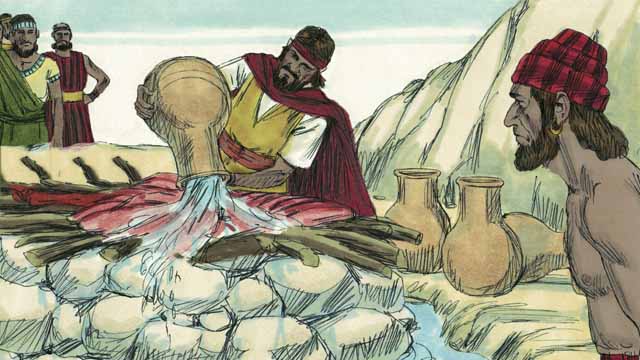
At the end of the day, Elijah prepared a sacrifice to God. Then he told the people to pour twelve huge pots of water on top of the sacrifice until the meat, the wood, and even the ground around the altar were completely wet.
天将晚,以利亚为神准备了一份祭品。然后他用12大锅的水浇在祭品上,直到整个祭品,木头,甚至祭坛周边的地面全都潮湿了。
Important Terms:
Translation Notes:
- (There are no notes for this frame.)
19-10
The Prayer of Elijah [19-10]
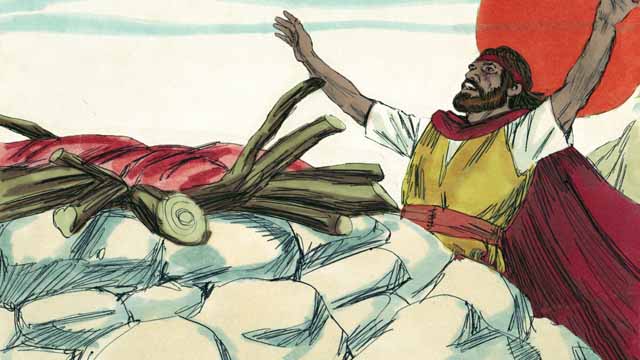
Then Elijah prayed, “Yahweh, God of Abraham, Isaac, and Jacob, show us today that you are the God of Israel and that I am your servant. Answer me so that these people will know that you are the true God.”
以利亚接着祷告道,“哦我的主啊,亚伯拉罕,以撒,雅各的神,向我们显示你是以色列的神,而我是你的仆人。请回答我,好叫这些人直到你就是神。”
Important Terms:
Translation Notes:
- show us - That is, "prove to us" or, "demonstrate to us."
- I am your servant - This could be translated as, "You have given me authority to serve you and do these things."
- Answer me - That is, "respond to my prayer" or, "send the fire that I have asked you for."
- these people will know - This may be translated as, "these people will see and understand."
19-11
God Answered with Fire [19-11]
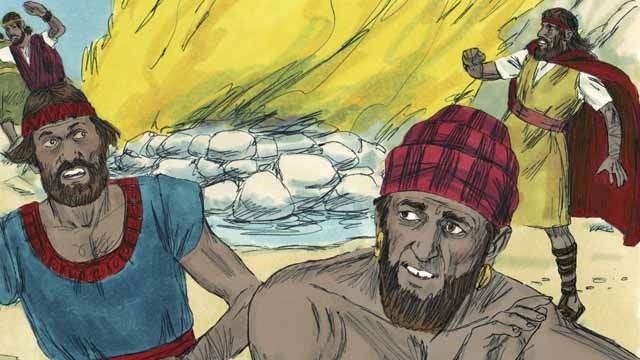
Immediately, fire fell from the sky and burned up the meat, the wood, the rocks, the dirt, and even the water that was around the altar. When the people saw this, they fell on the ground and said, “Yahweh is God! Yahweh is God!”
立刻,火从天上降下,烧着了祭品,木头,岩石,甚至祭坛周围的地面。人们看到这些,纷纷跪在地上说,“主是神!主是神!”
Important Terms:
Translation Notes:
- fell from the sky - This may be translated as, "suddenly came down from the sky."
- fell on the ground - They quickly lay down or knelt down on the ground. They were afraid of Yahweh because they had seen his power. They knew that only the true God could do that and bowed down to honor and worship him.
- Yahweh is God - This expression means that they understood that Yahweh is the only God, not just one god among others.
19-12
Killing the Prophets of Baal [19-12]
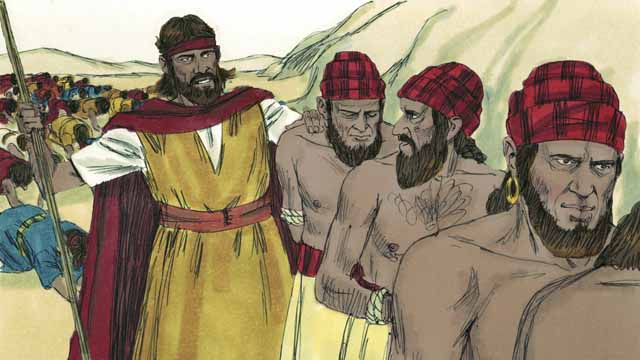
Then Elijah said, “Do not let any of the prophets of Baal escape!” So the people captured the prophets of Baal. Then Elijah took them away from there and killed them.
以利亚接着说,“不要让拜巴力的先知跑掉!”人们抓住拜巴力的先知。以利亚把他们带走并杀了他们。
Important Terms:
Translation Notes:
- escape - The prophets of Baal tried to run away after their god was proven to be a false god.
- captured – That is, "seized and held onto" or, "took hold of."
19-13
A Storm Ended the Drought [19-13]
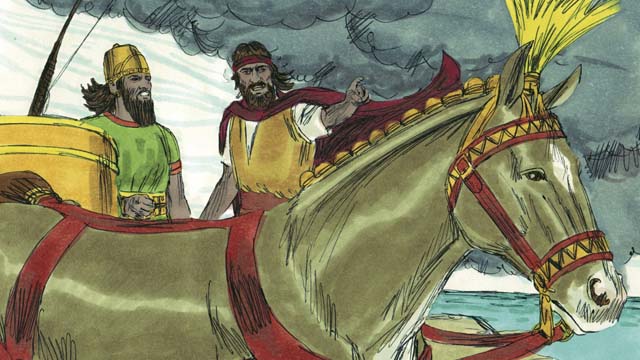
Then Elijah said to King Ahab, “Return immediately to the city, because the rain is coming.” Soon the sky grew black, and a heavy rain began. Yahweh had ended the drought and proved that he is the true God.
以利亚对亚哈说,“速速回城,雨要降下来了。”不久,天就变黑了,大雨降下。神结束了大旱并证明了他是唯一的真神。
Important Terms:
Translation Notes:
- the sky grew black - That is, "the sky became very dark." Heavy rainclouds covered the sky, making it look dark grey or black.
- drought – That is, "long dry time with no rain."
19-14
Naaman Came to Elisha [19-14]
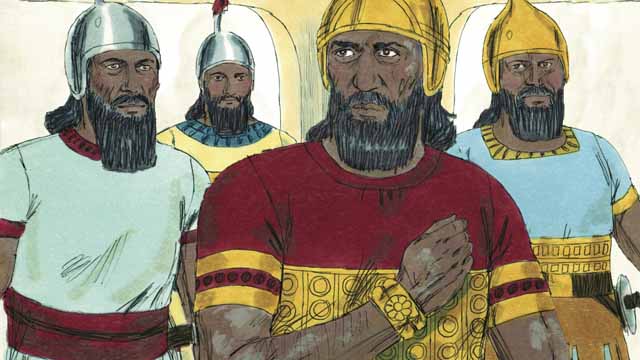
After the time of Elijah, God chose a man named Elisha to be his prophet. God did many miracles through Elisha. One of the miracles happened to Naaman, an enemy commander, who had a horrible skin disease. He had heard of Elisha so he went and asked Elisha to heal him. Elisha told Naaman to dip himself seven times in the Jordan River.
以利亚以后,神拣选了以利沙作先知。神通过以利沙行了很多神迹。一次,一个叫乃缦的敌军元帅,发现自己得了一种叫大麻疯的皮肤病。他听说过以利沙,于是他去见以利沙,求他医治。以利沙让他将自己浸到约旦河里7次。
Important Terms:
Translation Notes:
- an enemy commander - Naaman was a commander in the army of one of the countries that was Israel's enemy.
- He had heard of Elisha - This means that people had told Naaman that Elisha was able to perform miracles.
- he went and asked Elisha - That is, "he went to see Elisha and asked him." Naaman had to go into Israel to find Elisha and ask him to do this.
19-15
Naaman Was Healed [19-15]
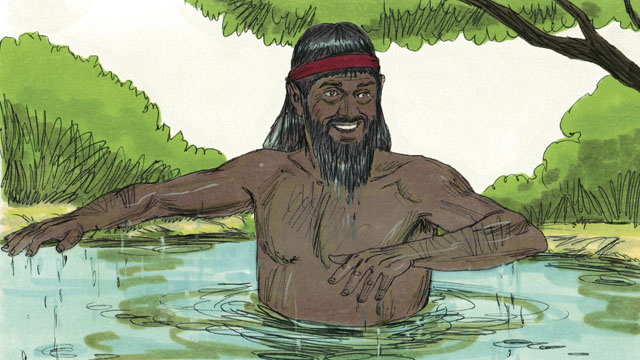
At first Naaman was angry and would not do it because it seemed foolish. But later he changed his mind and dipped himself seven times in the Jordan River. When he came up the last time, his skin was completely healed! God had healed him.
起初,乃缦很生气,不愿这样做。但是后来,他改变心意,将自己7次浸到约旦河里。当他最后一次从约旦河里出来时,他的皮肤被完全治愈了。神使他痊愈。
Important Terms:
Translation Notes:
- would not do it because it seemed foolish - Naaman would not do what Elisha said because he knew that washing alone could not heal his disease.
- he changed his mind - That is, "he decided to do what Elisha had told him to do."
19-16
The Prophets Warned the People [19-16]
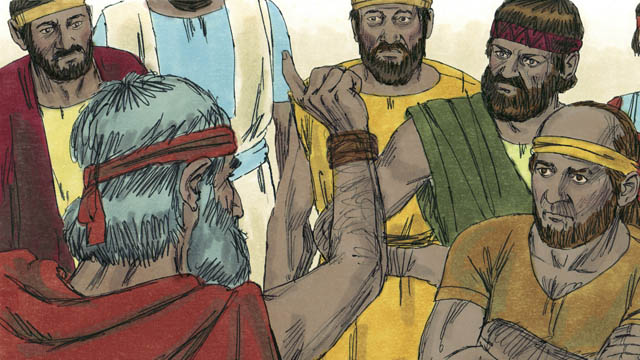
God sent many other prophets. They all told the people to stop worshiping idols and to start showing justice and mercy to others. The prophets warned the people that if they did not stop doing evil and start obeying God, then God would judge them as guilty, and he would punish them.
有许多其他的先知。他们都告诉人们停止敬拜偶像并显示公义和怜悯。先知们警告人们如果他们不从罪里回头,过上顺服的生命,神的审判就要来临,他将要惩罚他们。
Important Terms:
Translation Notes:
- start showing justice and mercy - This can be translated as, "start being just and merciful" or, "begin to demonstrate justice and mercy."
19-17
Jeremiah Suffered for God [19-17]
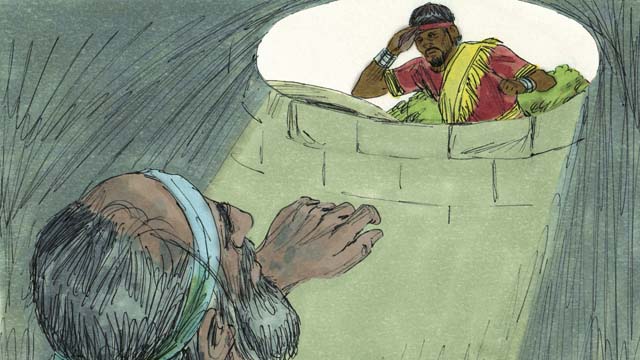
Most of the time, the people did not obey God. They often mistreated the prophets and sometimes even killed them. Once, the prophet Jeremiah was put into a dry well and left there to die. He sank down into the mud that was in the bottom of the well, but then the king had mercy on him and ordered his servants to pull Jeremiah out of the well before he died.
大多数时候,人们不会听先知的话。他们经常虐待先知,甚至会杀掉他们。有一次,先知耶利米被丢到一口枯井里等死。他沉到井底的泥里,但是国王怜悯他,在他快死之前将他拉了出来。
Important Terms:
Translation Notes:
- dry well - The well did not currently have any water in it, but it did still have mud in the bottom. This could be translated as, "empty well."
- had mercy on him – This means he was kind to Jeremiah and helped him.
19-18
The Message of the Prophets [19-18]
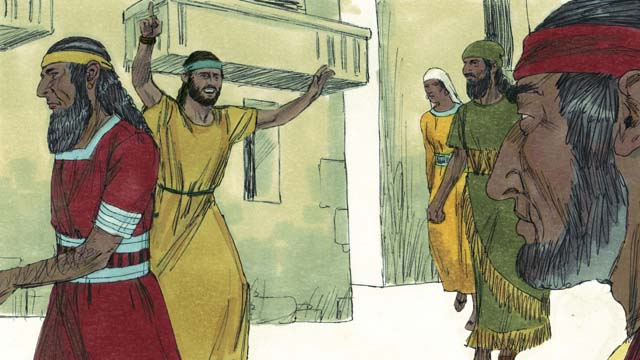
The prophets continued to speak for God even though the people hated them. They warned people that God would destroy them if they did not repent. They also reminded people of the promise that God’s Messiah would come.
尽管先知们被人们厌恶,他们仍然为神说话。他们警告人们如果不悔改,他们就要被毁灭。他们也提醒人们神应许的弥赛亚将要来到。
Important Terms:
Translation Notes:
- continued to speak for God - That is, "continued to tell the people what God wanted to tell them."
- of the promise that God's Messiah would come – This could be translated as, "that God had promised that his Messiah would come to save his people."
- A Bible story from - These references may be slightly different in some Bible translations.
